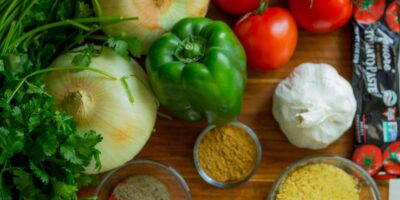My Experience on the Low FODMAP Diet
To raise awareness for IBS awareness month, I challenged myself to one week on the low FODMAP diet… how hard could it be!
My Personal Experience:
Now you should know, I don’t suffer from IBS, but this is something I had wanted to do for a while, for my own learning purposes. As a gut health dietitian, I know the low FODMAP diet inside out; I could literally talk about this topic in my sleep. So, it was time to finally experience the low FODMAP diet first hand to get a true understanding.
From working with clients, I knew planning was key. So, on Sunday, I did my meal planning for the week. Breakfasts were easy for me and I’m a creature of habit. Oats with berries, peanut butter and low FODMAP soy milk every morning suited me just fine. I planned my snacks; slightly green bananas, kiwi fruit, almonds, rice crackers and cheese. For lunch I was going to have either leftovers or eggs of some form, and then my dinners were a mix of The Friendly Food Co. recipes or adapted recipes to accommodate for low FODMAP.
EASY! … Or so I thought. Day one, I started on a high. By Tuesday lunch time, it was a different story. I planned my omelet but had forgotten to buy some low FODMAP bread. The hardest thing was that I could see the bread, I could smell it, and I so badly wanted to have it but I couldn’t! It just felt so unfair. By 2pm I had brain fog, I was tired and just craving a huge sugary cinnamon donut lathered in chocolate. I resorted to two sad looking rice crackers with marmite and cheese. Not what I felt like but at least it gave me some carbs and helped me last until dinner.
I should also mention that I follow a pescatarian diet, which naturally added another challenge to my week. I typically rely on legumes for my protein and often include them in some shape or form on a daily basis. However, Low FODMAP servings of legumes were far too small to rely on for protien. I found myself turning to eggs for protein almost every day because they were quick, easy, and to be honest, there wasn’t much choice. It’s safe to say I haven’t had many eggs since!
Something else that really stood out to me was that I was incredibly ravenous at night! However, the thought of trying to think of something low FODMAP to eat was a chore. I couldn’t eat what I really wanted to eat, and because I was so restricted I often ended up choosing nothing at all. It’s funny how I can come up with a list of low FODMAP snacks to eat for all my clients with the click of a finger, but when it came to implementing it myself it wasn’t that easy!
My Reflection
I was truly looking forward to the week being over and going back to my ‘normal’ food routine. For those with IBS it’s not that easy. Doing the low FODMAP diet made me realise how hard and restrictive it really is. For me, food should always be enjoyable and a time to connect with others. With the low FODMAP diet, brings a sense of isolation; having to eat something different to others or be the “difficult” one at a restaurant or friends house. You always have to pre-plan and pre-think about what will be available to eat. Gone are the days where you could spontaneously grab an ice-cream at the beach or stop by your local cafe for a pastry and coffee. It’s exhausting. I truly understand how it can be all consuming and I really take my hat off to all those IBS sufferers out there currently working their way through the low FODMAP diet. You’re all doing an incredible job!
So based on my experience and learnings, here are my top 5 tips to mastering the low FODMAP diet:
- Plan, plan plan: Plan your breakfasts, lunches, dinners and snacks for the week. Even having a few bulk made freezer friendly meals for those late nights home would have been super handy!
- Have tasty snack options on hand. Do a bit of research or ask your dietitian about low FODMAP snack options so you don’t get bored of eating the same thing on repeat.
- Variety is key: Include small serves of FODMAP containing foods. For example sushi with an eighth of an avocado (or 30g) is ok!
- Add flavour in a variety of ways: experiment with herbs, spices, sauces, lemon zest, ginger, vinegar and infused oils. Food doesn’t have to be boring and flavourless.
- You don’t have to be perfect and remember to still enjoy life!
Published: 20th April 2022
Author: Bianca Berton-Scarlet, Monash FODMAP trained Dietitian





This Post Has 0 Comments